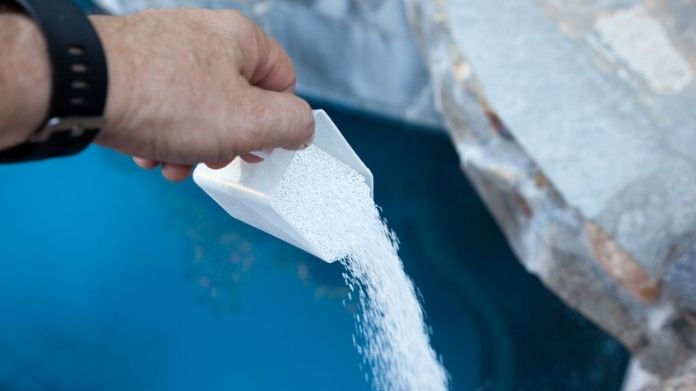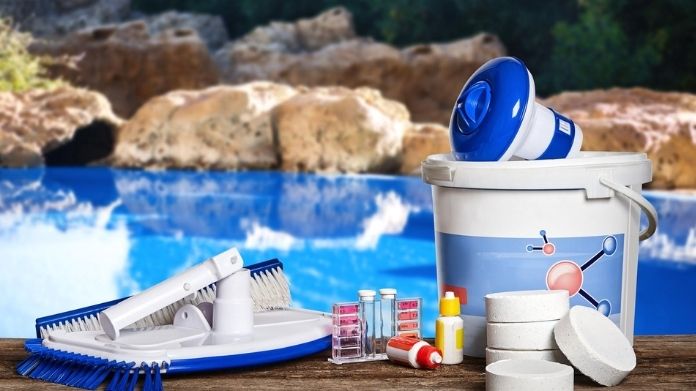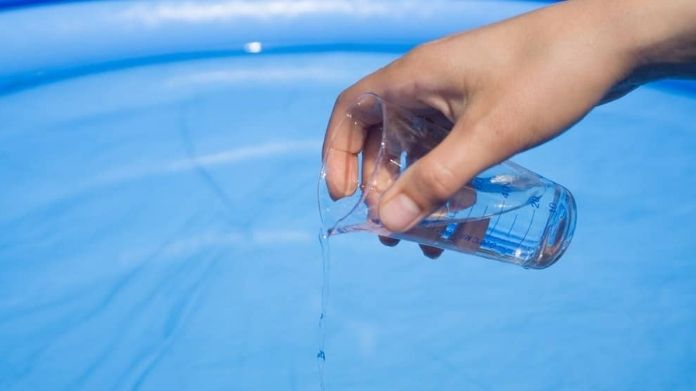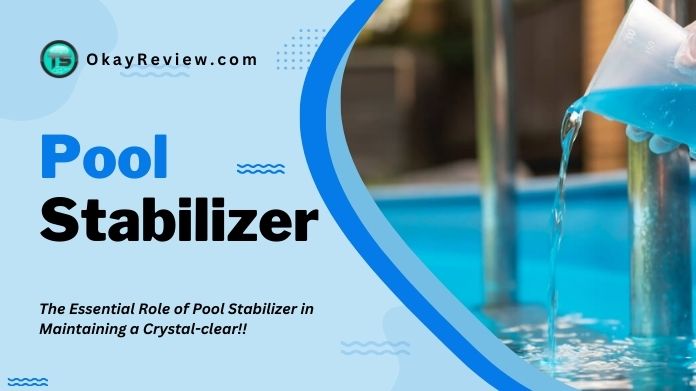Diving into a refreshing pool on a hot day is pure bliss. But have you ever paused to think about what keeps that water so inviting?
Pool Stabilizer is the unsung hero of your pool, working behind the scenes to ensure every swim is a delight.
In simple terms, Pool Stabilizer is the trusty sidekick to chlorine, the pool’s main defender against unwanted germs. Together, they ensure your pool stays sparkling and safe.
Curious about this magic ingredient? Let’s dive deeper into what Pool Stabilizer is and why your pool loves it! 🌊🎉
Table of Contents
What is a Pool Stabilizer?
 Have you ever wondered how your swimming pool stays clean and clear, especially under the hot sun? The answer is “Pool Stabilizer.” Now, let’s break it down in simple terms.
Have you ever wondered how your swimming pool stays clean and clear, especially under the hot sun? The answer is “Pool Stabilizer.” Now, let’s break it down in simple terms.
A Pool Stabilizer is like a shield for the chlorine in your pool. Chlorine is the hero that fights off the bad stuff, like germs and algae.
But, when the sun shines bright, it can weaken our hero. That’s where Pool Stabilizer steps in. It acts like sunglasses for the chlorine, protecting it from the sun’s strong rays.
In short, Pool Stabilizer helps the chlorine do its job better and longer. So, the next time you dip in clear pool water, remember the unsung hero, Pool Stabilizer, working behind the scenes.
Also, if you want to enhance the looks of your pool, then you must include one of the wonderful folding lounge chairs to complete your ideal pool area.
The Role of Chlorine and Its Relationship With Stabilizers
 Chlorine is like the superhero of your swimming pool. Its main job? To keep the water clean by fighting off harmful germs and bacteria.
Chlorine is like the superhero of your swimming pool. Its main job? To keep the water clean by fighting off harmful germs and bacteria.
Every time you swim, bacteria enter the pool, and chlorine ensures these unwanted guests don’t overstay their welcome.
However, every superhero has a weakness. For chlorine, it’s the sun. The sun’s powerful UV rays can weaken chlorine, reducing its ability to keep the pool clean.
This is where Pool Stabilizer steps in, acting as the trusty sidekick. Pool Stabilizer, or cyanuric acid, forms a protective shield around chlorine.
This shield ensures that chlorine doesn’t get broken down too quickly by the sun, allowing it to stay active and effective for longer.
When and How to Use Pool Stabilizer?
 So, you’ve got your swimming pool set up and heard about Pool Stabilizer. But when should you use it, and how? Let’s break it down in easy-to-understand terms.
So, you’ve got your swimming pool set up and heard about Pool Stabilizer. But when should you use it, and how? Let’s break it down in easy-to-understand terms.
Think of Pool Stabilizer as sunscreen for your pool’s chlorine. Just like you wouldn’t step out into the sun without protection, your pool’s chlorine needs its shield, too.
The best time to introduce Pool Stabilizer is when you first fill your pool, or the water looks slightly off, like it’s lost its usual sparkle.
Here’s how to Use a Pool Stabilizer,
- Test First: Before adding anything, test your pool water. You want to see how much stabilizer is already there. Aim for a level between 30 ppm and 50 ppm.
- Measure: Based on your pool’s volume and the test results, measure the amount of Pool Stabilizer you’ll need.
- Mix it Up: Instead of adding the stabilizer directly, mix it with pool water in a bucket. This helps it dissolve better.
- Pour Slowly: Gently pour the mixture into the pool, spreading it around. This ensures an even distribution.
- Stir it Up: Run your pool pump for a few hours. This helps mix the Pool Stabilizer throughout the pool.
- Test Again: After a day, test the water again to ensure you’ve hit the right stabilizer level.
Pool Stabilizer Alternatives
Having a swimming pool is a joy, but maintaining water quality is a responsibility. While many pool owners rely on chlorine and Pool Stabilizer to keep their water clean and clear, some look for alternatives.
Let’s explore some of these options in simple terms.
- Bromine: A chemical relative to chlorine, often used in spas. It is less irritating to the skin and eyes but less sun-resistant than chlorine.
- Saltwater Systems: Systems that convert salt into chlorine. They offer a steady chlorine supply and are gentler on the skin but still produce chlorine.
- Ozone Generators: Devices that create ozone to kill bacteria. Reduce chlorine needs but can be tough on pool equipment.
- Mineral Systems: Use minerals like silver and copper for sanitization. Decrease chlorine usage but don’t eliminate it, with concerns about metals in water.
- UV Systems: Utilize ultraviolet light to eliminate bacteria. Lower chemical needs but require a residual sanitizer for full effectiveness.
Conclusion
Pool stabilizers are essential for maintaining a clean and safe swimming environment. They ensure that chlorine remains effective for longer, reducing maintenance efforts and costs.
By understanding the role of stabilizers and monitoring their levels, pool owners can provide a pleasant and healthy swimming experience.
Frequently Asked Questions
Q. What is the Primary Purpose of a Pool Stabilizer?
Ans. Pool stabilizers, composed of cyanuric acid, protect chlorine from the sun’s UV rays, preventing it from breaking down rapidly and ensuring it remains effective in sanitizing the pool.
Q. How Often Should I Check the Stabilizer Levels in My Pool?
Ans. It’s recommended to check the stabilizer levels in your pool once a week to ensure they remain within the ideal range of 30 ppm to 50 ppm.
Q. What Happens if the Stabilizer Level in My Pool is Too High?
Ans. If stabilizer levels exceed 50 ppm, it can inhibit the effectiveness of chlorine, leading to cloudy or greenish water. In such cases, you might need to partially drain and refill the pool to reduce the stabilizer concentration.
Q. Are There Alternatives to Chlorine and Stabilizers in My Pool?
Ans. Yes, there are alternatives like bromine and oxygen generators. However, bromine is suitable for indoor pools as it lacks an effective stabilizer for sunlight, while oxygen generators oxidize bacteria, eliminating the need for stabilizers.
Q. Can I Use Stabilized Chlorine in My Pool?
Ans. Yes, stabilized chlorine is a combination of chlorine and stabilizer. It’s a practical option as you only need to add one chemical. However, it can limit your ability to control the stabilizer level, potentially leading to high concentrations.

